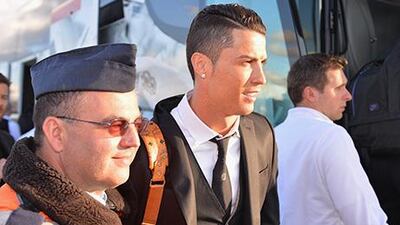In Alcochete, on the south side of the river Tagus opposite central Lisbon, Dolores Aveiro will always be welcome at certain restaurants and cafes.
She still pops into some, from time to time, on visits to Portugal’s capital, to reminisce with the staff who were there more than a decade ago when she used to visit her homesick son.
Alcochete is a quiet refuge away from the buzz of big city Lisbon, and it is where Dolores will watch the most celebrated living Portuguese citizen, her son, strive for another personal coronation on Saturday night.
Journeying to Lisbon was once a stressful, traumatic experience for Cristiano Ronaldo dos Santos Aveiro. It meant leaving his family in Madeira, a distant Portuguese island outpost in the Atlantic Ocean, to pursue a learning opportunity.
It felt hostile. He was a boarder from the age of 12 at Sporting Club’s football academy in Alcochete and he stood out there, not only for his speed and dexterity with a ball, but also his provincialism. Nobody from Madeira had ever enrolled there; other kids laughed at his accent.
There were times when he was home for a brief holiday that he did not want to return to Lisbon. Dolores comforted him and reminded him of his dream of becoming a professional footballer; Sporting offered him the best possible chance, he would be reminded.
Several of the Portugal greats he grew up watching had passed through its youth structures: Paolo Futre, who would become a star at Atletico Madrid, and Luis Figo, a future winner of the Ballon d’Or and European Cup winner with Real Madrid, just two.
Gradually he settled and started to shine, and Lisbon began to talk about the prodigy Sporting had unearthed in a working-class part of Madeira.
Then, before he had even had a chance to establish himself as a Sporting star, Manchester United offered such a sizeable fee for him, at 17 years old, that he moved further away from Madeira to the north of England.
The rest is history. At 29, Ronaldo is twice the winner of the World Footballer of the Year award, a prize he holds at present. In club football, he has devoured scoring records and domestic prizes.
Yet, over 11 years representing English football’s wealthiest club, United, and then Spain’s, Madrid, his haul of Champions League wins is slight.
He won the trophy with United, six years ago, lost a final with them against Barcelona in 2009 and has been regularly frustrated at the semi-final stage with Madrid since.
Reaching any European Cup final is special and the venue of Saturday night’s showdown, the capital of his native Portugal, makes it almost look designed for a Ronaldo virtuoso show.
As tens of thousands of supporters of Real and Atletico Madrid approach the Estadio da Luz, they will pass a statue, draped in scarves and probably some floral tributes, of Eusebio, the one sportsman in Portuguese history who might challenge Ronaldo for the status of the nation’s greatest. He died in January.
Ronaldo overtook Eusebio’s scoring record for the national team this season and, although the Luz is Benfica’s stadium and Sporting, Ronaldo’s nursery, are Benfica’s fiercest rivals, an arena given mostly over to fans from Iberia’s other capital will feel reassuringly familiar.
Ronaldo has suffered and soared at the Luz. He was there for a rare United failure in Europe, eight seasons back, when Benfica knocked them out of the Champions League at the first stage. He cried at the Luz when, 10 years ago, Greece beat his Portugal in the final of the European championship.
Time was, he would score freely for Portugal at other places, such as Lisbon’s Jorge Alvalade stadium or the Dragao in Porto, but not at the Luz.
In 2011, he broke his barren record there with an important, two-goal contribution to a European championship play-off against Bosnia and then ushered Portugal to next month’s World Cup with a goal in the Lisbon leg of their play-off against Sweden last November.
Some benfiquistas will always resent Ronaldo for his Sporting past. Some Portuguese find Ronaldo’s brashness and obvious vanity distasteful.
“He will break all the records for Portugal,” Figo, Portugal’s only other Ballon d’Or winner of this century, told the Laureaus website this week. “But whether you place him above Eusebio in the country’s greats is subjective.”
It seems clear a majority of Portuguese are proud of their native son. When Sepp Blatter, the president of Fifa, mocked Ronaldo’s rather martial running style in a speech to the Oxford Union at the end of last year, footage of which was broadcast internationally, banners and posters started appearing around Lisbon, with the slogan: “Blatter, You’re Offside! Ronaldo is The Greatest!”
On Saturday night, most of his compatriots will want him to shine, but also to come through the final fit and healthy. He belongs solely to Portugal as of tomorrow, as they prepare for the World Cup.
sports@thenational.ae
You can also follow our sports coverage on Twitter @SprtNationalUAE


